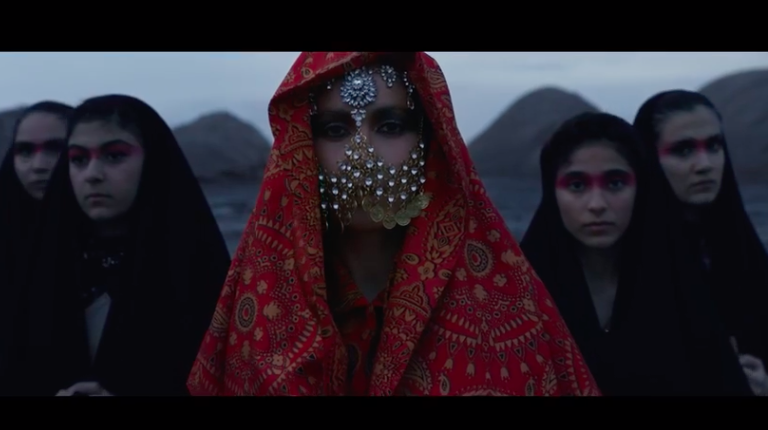I fell in love with Mentrix’ debut album My Enemy, My Love when listening to it for the first time, and I fall in love with it again each time I play it. The combination of hypnotic Sufi percussive rhythms with simple but well-crafted melodies and honest stripped-down lyrics takes listeners on a journey that is enhanced by unique videos. To shed light on the diverse influences of her music and visuals, Mentrix tells us about her own exploration of Iran, France, the UK, and Germany that led her to release this distinctive album.
Mentrix, can you tell us about your artist name?
I made up the word as I was looking for the female word for mentor. I know that the word is genderless but I always wished for a female mentor in my life and I needed to name her. Mentrix is this female element that inspires me.
And about your journey from Iran to Germany?
I left Iran as a child when I was eight years old. We moved to France to return to Iran five years later. I graduated from high school in Tehran and applied for uni in Paris. I was accepted and returned to Paris in early 2000 to study economics. I was always very frustrated academically. Also, I was working full time as a waitress to support myself. These were very hard times. By the time I finished my masters I knew that I was meant to have a creative path, but Paris was not offering many opportunities. As an immigrant worker with an economics degree, my options were limited. A change needed to happen. I moved to the UK in 2011 and this was a turning point. I discovered a society where music was a medium used by everyone. No academic background needed; in fact, the self-thought was praised and the more different the better. So I began experimenting with ideas, writing songs and soon I started to train as a vocalist.
After four years spent in the UK, I moved to Berlin for love. This was another great move. The quality of life and the cosmopolitan punk city continue to seduce me. I set up my label House of Strength when I moved to Berlin. I signed a distribution deal with !K7 music and with the support of Initiative Musik – a government art fund for musicians – I released my debut album My Enemy, My Love in early April of this year. It has been a good journey really.
How would you say this particular story of yours shapes how you create music?
As a creative, you need space, time, and an environment that is supportive in one way or another. In the UK, the mentality of British society, when it comes to music, was a great source of inspiration. This allowed me to experiment freely with my ideas. In Berlin, I had the luxury of space and time. For the first time in my life, I have no neighbours that complain about my drumming. It is also here that I got more into production thanks to Ableton. They hooked me up with free software, and with all those free tutorials online I was running my own home studio. Where you are in the world defines the opportunities that you are given in life. I have moved quite a bit… and yes, these moves have influenced my music-making and have also enabled me to get my music out there.
Regarding both your music and videos, what would you say are your biggest influences?
Clearly my Iranian roots are an undeniable source of influence and inspiration. I am also very influenced by the Western world. And by that, I mean post-punk like Siouxsie and the Banshees, indie punk like Karen O, folk-pop like Björk, and what I call post-immigrant-pop like M.I.A.
Speaking of visuals, it was important for me to create visuals in Iran, where I was born and where I lived. A country that is often portrayed in a questionable way in the media. It was a huge challenge not only to show the world what is possible in Iran but to also tell the Iranian people living in Iran and elsewhere, “hey, we can do some amazing things in this place, so let’s put the bar higher and believe in the possible.” It was the first time since 1979 that such videos have been made in Iran. I am very proud of what we have achieved and I look forward to creating more stunning films and visuals in this beautiful country.
Dance also seems to be an important part of your musical creation, do you dance yourself?
I do. I go to Flying Steps Academy here in Berlin. I work with a contemporary dance teacher and choreographer Nelody Ahlroth who travelled with me to Iran. We organised several women-only dance workshops in Tehran two weeks prior to shooting. It was a great experience we look forward to renewing in the near future. This is also how we came to cast our dancers you see in the Nature video. It was important for me to have Iranian girls from the urban underground dance scene in the video.
What do you have in mind for your next projects?
I have just released an EP of remixes from the album. Check it out, it’s called Men Mix Mentrix – randomly enough, I ended up with only dudes offering free remixes… And I am working on a script. A short film is the next project. And then obviously the next album is on my mind… but until then you will hear a single or two, fruit of interesting collaborations here and there that will remind you that I make music before anything else. Music is at the core of my creative work. It is the most selfless form of art, and practicing it is a great reminder of just that.
More about Mentrix on www.mentrixmusic.com
Interview by Nadia Says


